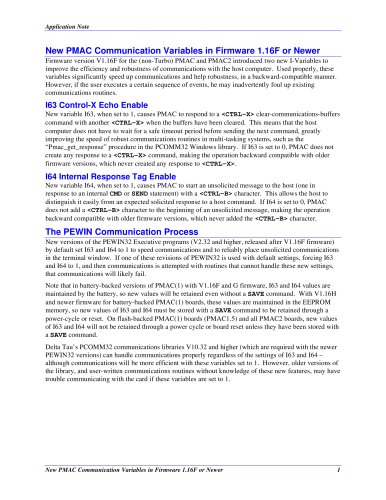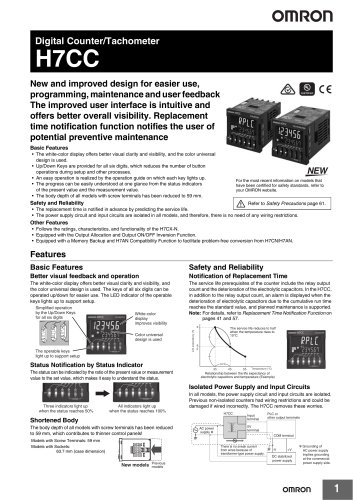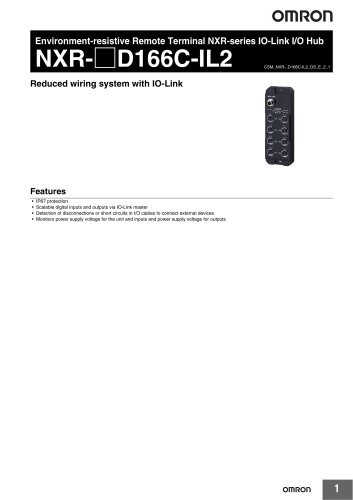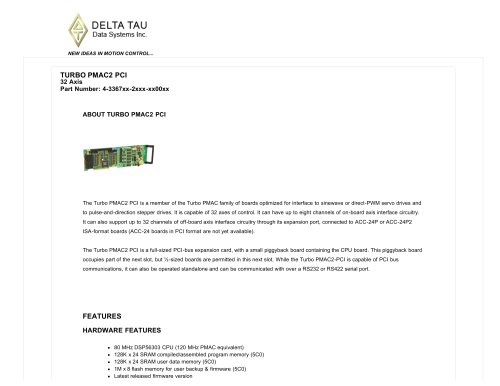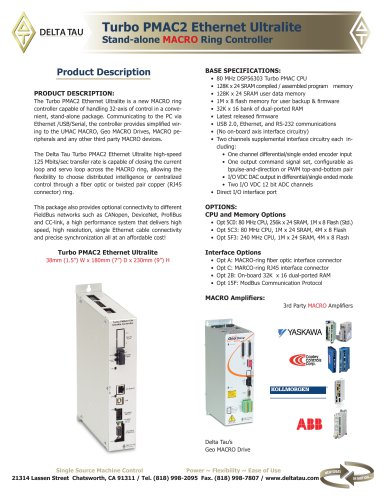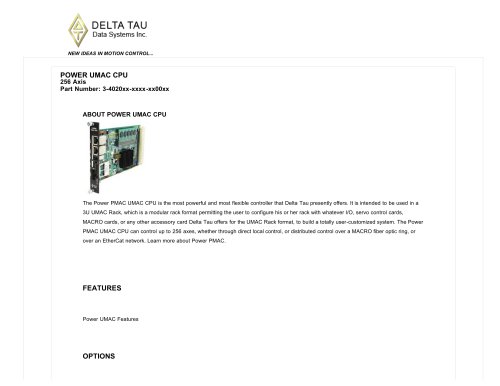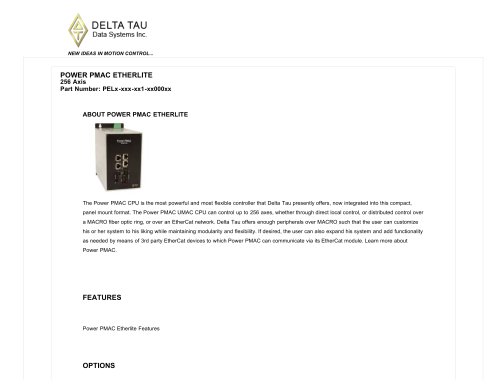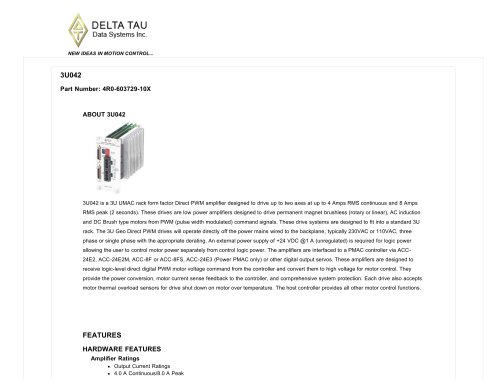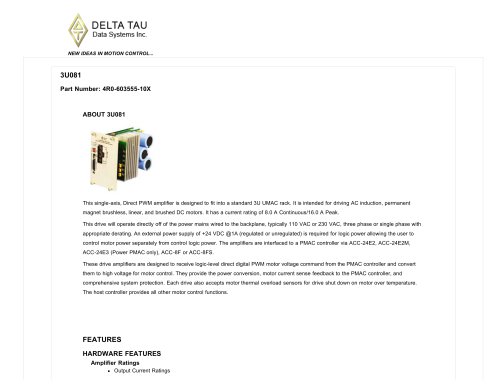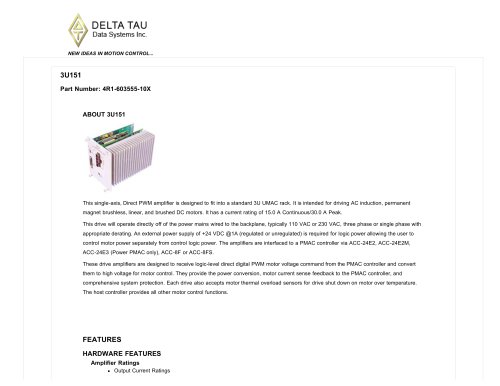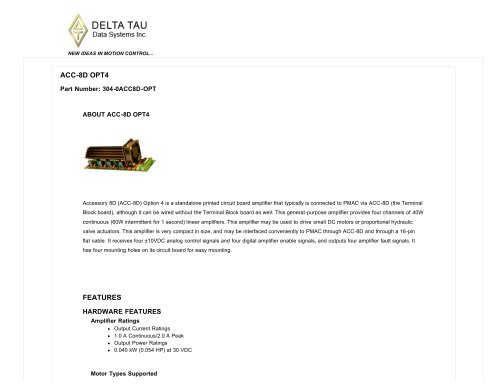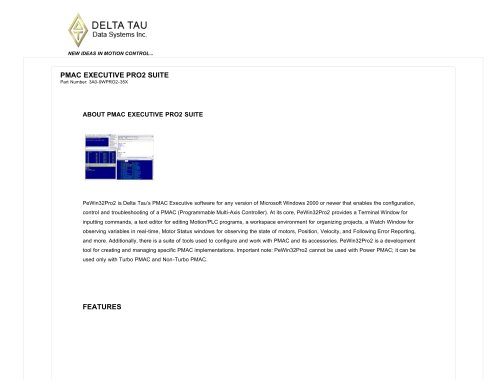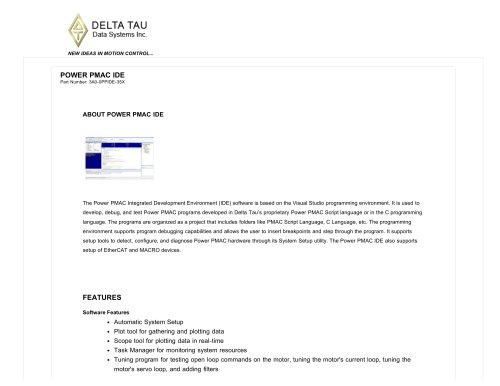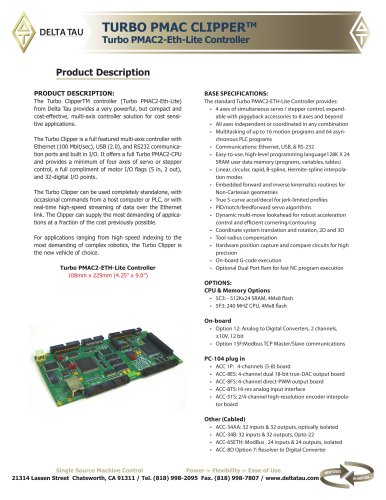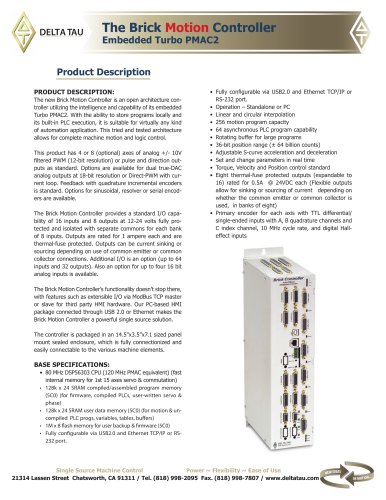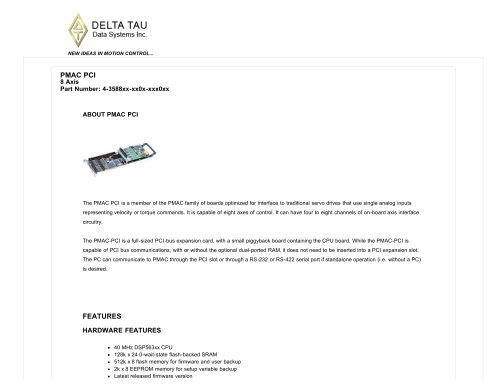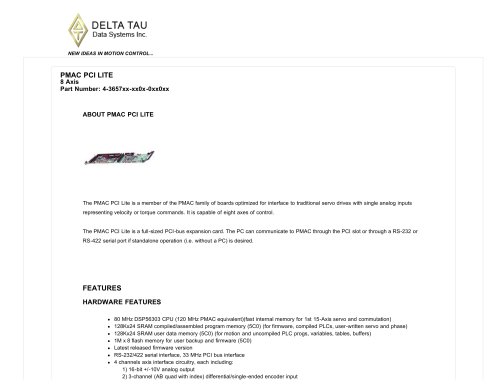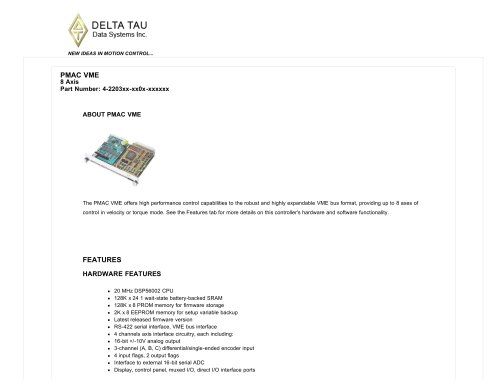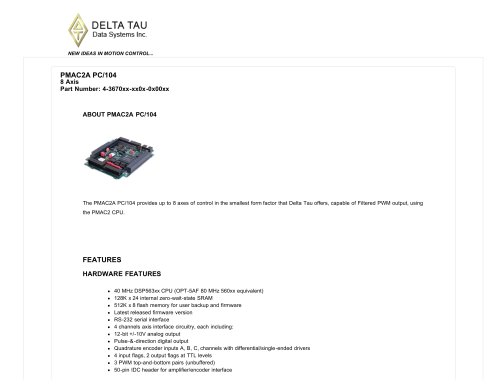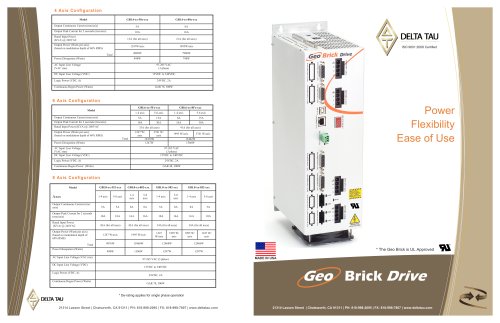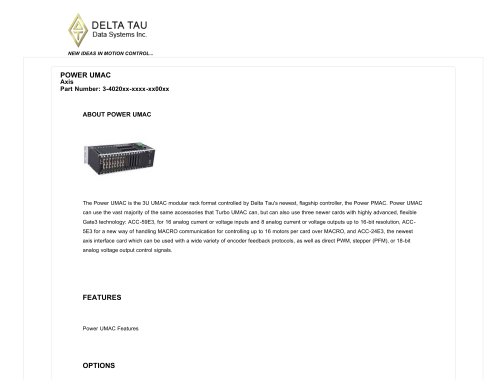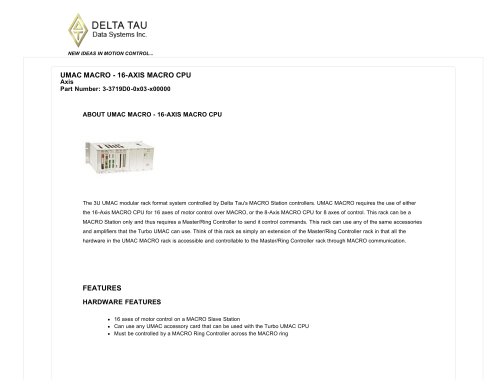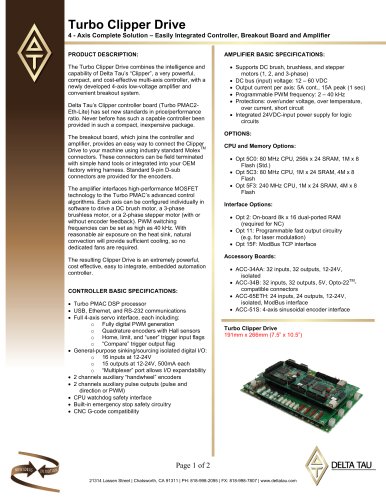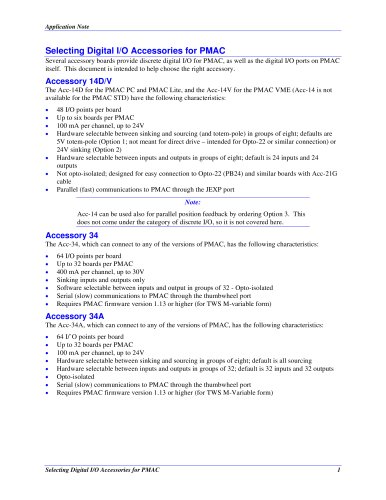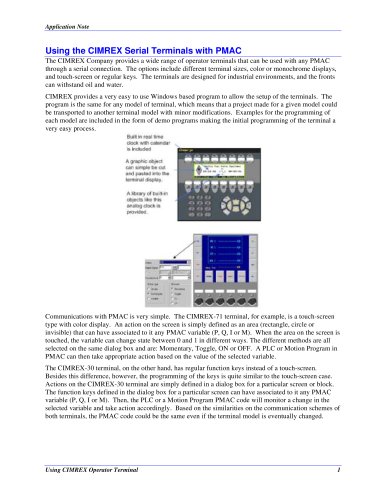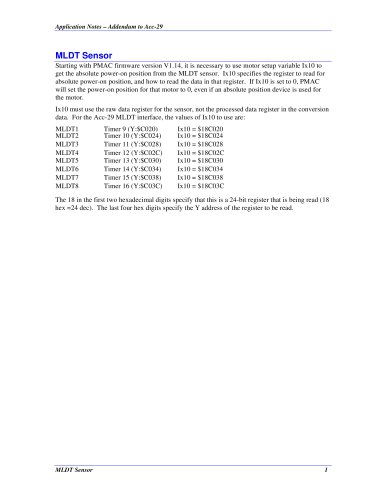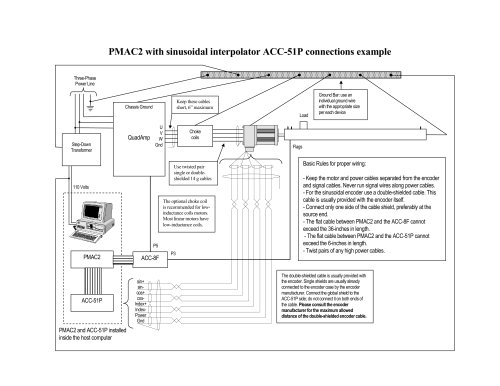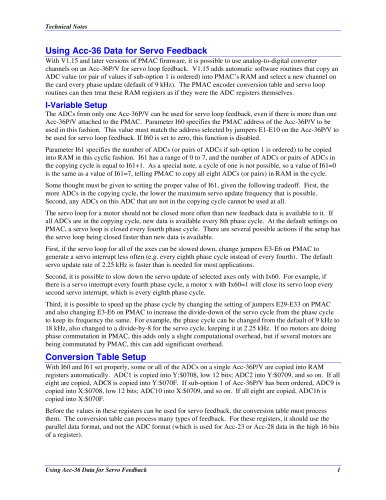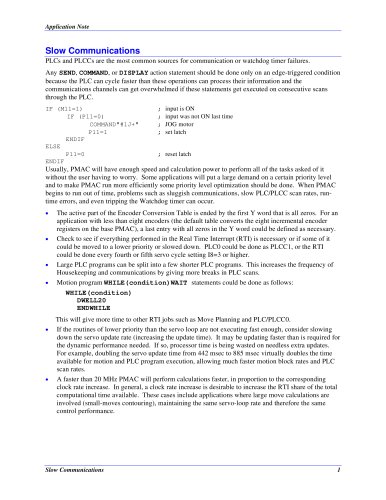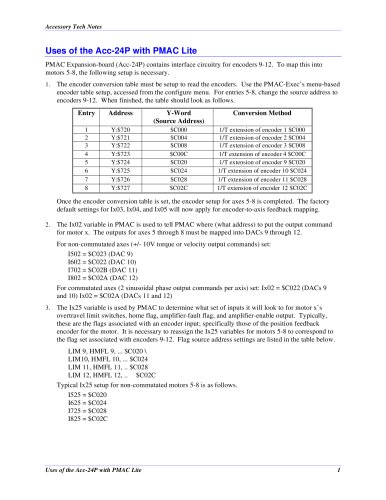 Website:
Delta Tau
Website:
Delta Tau
Catalog excerpts

Application Note Firmware version V1.16F for the (non-Turbo) PMAC and PMAC2 introduced two new I-Variables to improve the efficiency and robustness of communications with the host computer. Used properly, these variables significantly speed up communications and help robustness, in a backward-compatible manner. However, if the user executes a certain sequence of events, he may inadvertently foul up existing communications routines. > New variable I63, when set to 1, causes PMAC to respond to a clear-communications-buffers command with another when the buffers have been cleared. This means that the host computer does not have to wait for a safe timeout period before sending the next command, greatly improving the speed of robust communications routines in multi-tasking systems, such as the Pmac_get_responseӔ procedure in the PCOMM32 Windows library. If I63 is set to 0, PMAC does not create any response to a command, making the operation backward compatible with older firmware versions, which never created any response to . > New variable I64, when set to 1, causes PMAC to start an unsolicited message to the host (one in response to an internal CMD or SEND statement) with a character. This allows the host to distinguish it easily from an expected solicited response to a host command. If I64 is set to 0, PMAC does not add a character to the beginning of an unsolicited message, making the operation backward compatible with older firmware versions, which never added the character. > New versions of the PEWIN32 Executive programs (V2.32 and higher, released after V1.16F firmware) by default set I63 and I64 to 1 to speed communications and to reliably place unsolicited communications in the terminal window. If one of these revisions of PEWIN32 is used with default settings, forcing I63 and I64 to 1, and then communications is attempted with routines that cannot handle these new settings, that communications will likely fail. Note that in battery-backed versions of PMAC(1) with V1.16F and G firmware, I63 and I64 values are maintained by the battery, so new values will be retained even without a SAVE command. With V1.16H and newer firmware for battery-backed PMAC(1) boards, these values are maintained in the EEPROM memory, so new values of I63 and I64 must be stored with a SAVE command to be retained through a power-cycle or reset. On flash-backed PMAC(1) boards (PMAC1.5) and all PMAC2 boards, new values of I63 and I64 will not be retained through a power cycle or board reset unless they have been stored with a SAVE command. Delta Taus PCOMM32 communications libraries V10.32 and higher (which are required with the newer PEWIN32 versions) can handle communications properly regardless of the settings of I63 and I64 Җ although communications will be more efficient with these variables set to 1. However, older versions of the library, and user-written communications routines without knowledge of these new features, may have trouble communicating with the card if these variables are set to 1. > New PMAC Communication Variables in Firmware 1.16F or Newer 1 size="-1">
Open the catalog to page 1
Application Note If previously working applications software cannot communicate with the PMAC, but PEWIN32 can, I63 and I64 must be set to 0 in order to establish communications with the application. Use the following procedure to set them back to 0. 1. Establish communications with the PMAC using PEWIN32 software. 2. Close the terminal window in PEWIN32. 3. Start the MOTIONEXE.EXE applet in the PEWIN32 directory to redefine the communications protocol with the card. 4. In defining the protocol, make sure the check box for setting I63 and I64 is not checked. This setting can be found in the...
Open the catalog to page 2All Delta Tau catalogs and technical brochures
-
Digital Counter/Tachometer H7CC
64 Pages
-
TURBO PMAC2 VME ULTRALITE
7 Pages
-
TURBO PMAC2 REALTIME EXPRESS
3 Pages
-
TURBO PMAC2 PCI
7 Pages
-
TURBO PMAC VME
6 Pages
-
POWER UMAC CPU 256 Axis
4 Pages
-
3U042
4 Pages
-
3U081
4 Pages
-
3U151
4 Pages
-
ACC-8D OPT4
3 Pages
-
ACC-8D OPT4A
3 Pages
-
ADVANTAGE 900 BASIC PACKAGE
3 Pages
-
PMAC MINI PCI 8 Axis
7 Pages
-
PMAC PCI 8 Axis
7 Pages
-
PMAC PCI LITE 8 Axis
7 Pages
-
PMAC VME 8 Axis
6 Pages
-
PMAC2A PC/104
6 Pages
-
POWER UMAC
4 Pages
-
TURBO UMAC
6 Pages
-
PMAC-NC PRO2 RUNTIME
3 Pages
-
Turbo Clipper Drive
2 Pages
-
Battery Issues with PMAC ISA
5 Pages
-
Digital IO accessories
2 Pages
-
MLDT Sensor
1 Pages
-
Slow communications
1 Pages

